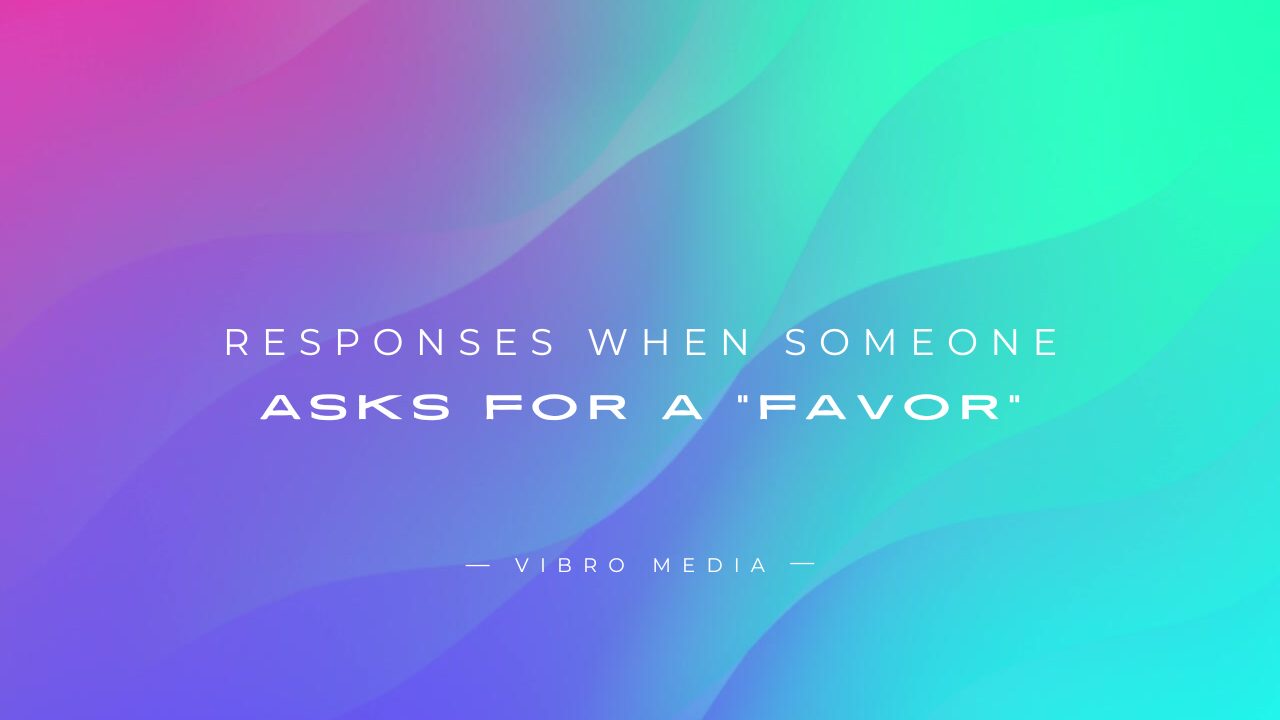When someone asks for a favor, it can make you awkward. On one hand, you want to be helpful, but on the other, you don’t want to be taken advantage of. Understanding how to respond tactfully can relieve stress and maintain healthy relationships. So, how do you manage these requests while staying true to your needs and boundaries? Let’s break it down.

200+ Responses When Someone Asks for a “Favor”
Immediate Acceptance
- I’m happy to help!
- Yes, of course! What can I do for you?
- I’d be delighted to assist with that.
- Sure thing, just let me know the details.
- Count me in! What do you need?
- I’m on it. What’s the task?
- No problem at all. I can handle that.
- Consider it done. What’s next?
- I can help right away. What’s the favor?
- I’m available to assist. What’s up?
Conditional Acceptance
- I can help with that, but I must finish something else first.
- Sure, but can it wait until this afternoon?
- I’m able to assist if you don’t mind waiting a bit.
- I’m happy to help, but could we set a specific time?
- I’m available to help, but I must check my schedule.
- I can do it, but I’ll need more information first.
- I can help out, but I have a tight deadline. Can we work around it?
- Sure, but I might need to delegate some of it.
- I can assist, but could you confirm the details first?
- I’m willing to help, but let’s discuss the timing.
Polite Decline
- I’m sorry, but I can’t help with that right now.
- Unfortunately, I’m not able to assist at the moment.
- I wish I could, but I’m unable to help this time.
- I’m sorry, but I have other commitments.
- I’d love to, but I’m not available.
- Regrettably, I won’t be able to assist.
- I’m not in a position to help right now. Sorry!
- I wish I could, but it’s impossible for me now.
- I’m afraid I have to decline this request.
- I’m sorry, but I have too much on my plate.
Deferral
- I can’t help now, but I’ll check with you later.
- Let me get back to you after I review my schedule.
- I’m unavailable now, but I can assist in a few days.
- I’ll need to think about it. Can I let you know tomorrow?
- I’m tied up, but I’ll follow up with you soon.
- I can’t give you an answer immediately, but I’ll get back to you.
- I need to sort some things out first; let’s touch base later.
- I’ll have to delay this. Can I check in with you next week?
- I’m unsure I can help now, but let’s revisit it later.
- I’m not able to commit at the moment. Let’s discuss it later.
Request for More Information
- Can you provide more details about what you need?
- What exactly does the favor involve?
- Could you clarify what you’re asking for?
- What’s the scope of the task?
- How much time do you estimate this will take?
- What do you need help with?
- What are the specific details I should be aware of?
- What’s the urgency of this request?
- Please give me more context about the favor.
- Can you outline what’s involved in this request?
Offering Alternatives
- I can’t help, but you might consider asking [name].
- Have you tried [alternative solution] for this?
- I’m unavailable, but perhaps [another method] might work.
- I can’t assist directly, but maybe [resource] could be useful.
- I cannot help, but I suggest contacting [organization].
- I can’t help, but [tool] might be helpful.
- I’m tied up, but you might want to look into [option].
- I’m not the best fit, but [name] has experience with this.
- You could also try [solution] as a workaround.
- I cannot assist, but here’s a link that might help.
Negotiation or Counter-Offer
- I can help, but can we shift the deadline a bit?
- I’m available, but could you help me with [task] in exchange?
- I can assist with this if you can handle [another task].
- I’m willing to help, but can we adjust the scope of the favor?
- I’ll help, but can we schedule a better time for me?
- I’m happy to assist, but can you help me with another matter?
- I can do this, but can you also manage [part of the task]?
- I’m able to help, but let’s discuss a fair trade.
- I can assist, but could you consider extending the timeline?
- I’m willing to help out, but let’s negotiate the details.
Humorous or Playful Response
- I’ll help, but you owe me a coffee for this one!
- Only if you promise to do the same for me someday—deal?
- I’m on it! Just don’t expect me to be a superhero.
- I’ll help, but you better not make this a regular thing!
- I’m happy to assist, but I expect some chocolate in return.
- Alright, but remember, I’m not a professional!
- I can do that—just don’t ask me to wear a cape!
- Sure thing, but I’m charging in ‘good vibes’ only.
- I’ll help out, but my superpowers are limited!
- Consider it done, but my help comes with a side of jokes.
Reluctant Acceptance
- Alright, I’ll help, but I’m not thrilled about it.
- I can do it but don’t make this a habit.
- I’ll help out, but I’m not exactly jumping for joy.
- Okay, I’ll assist only because I feel bad saying no.
- I can do it, but I’m not exactly excited about it.
- I’ll handle this, but I’m not enthusiastic about it.
- Fine, I’ll do it, but this is a one-time thing.
- I can help, but it’s not what I wanted to do.
- I’m not thrilled, but I’ll make it work this time.
- I’ll help but don’t expect me to be overjoyed about it.
Firm Refusal with Explanation
- I’m sorry, but can’t help because I’m already overextended with my current projects.
- Unfortunately, I’m tied up with other commitments and can’t take this on.
- I’d love to help, but my schedule is too packed.
- I can’t attend because I’m currently dealing with a personal matter.
- I’m afraid I have to decline because I have prior obligations.
- I’m unable to help because I’m currently working on a deadline.
- I wish I could, but my workload is too heavy right now.
- I’m sorry, but I can’t help due to a scheduling conflict.
- I can’t assist because I’m currently focusing on an urgent task.
- I’m unable to help because I’m already committed to other responsibilities.
Redirect the Request
- Have you tried asking [name]? They might be able to help you.
- You should reach out to [department/resource] for this.
- I’m not the best person for this, but [alternative] could be a good fit.
- Try contacting [organization] for assistance with this.
- Perhaps [colleague] would be the right person to ask.
- You should check with [expert/resource] for better guidance.
- Consider reaching out to [network] for help with this.
- Have you thought about [solution]? It might be worth a shot.
- You could also look into [option] as an alternative.
- Maybe [friend/colleague] can assist with this request.
Delegation
- I can’t do this myself, but I’ll ask [name] to help you.
- I’m busy, but [colleague] is a great person to assist with this.
- I’ll forward your request to [team/resource].
- I can’t take this on, but I’ll delegate it to someone who can.
- I’ll pass this along to [contact], who might be able to help.
- I’m unavailable, but [team member] is a good resource.
- I’ll direct you to [department] who can handle this.
- I’ll see if [associate] can handle this for you.
- Let me involve [person] who has the expertise you need.
- I’m not able to help, but I’ll delegate this task to [name].
Seek Collaboration
- How about we work on this together? I could use a hand.
- Let’s team up on this. I’ll help if you’re up for it.
- I can contribute, but let’s make it a joint effort.
- Why don’t we tackle this as a team? It might be more effective.
- I can assist, but it would be great if we collaborated on it.
- Let’s join forces to get this done more efficiently.
- I’m willing to help if you’re open to working together.
- How about we collaborate on this? I can take on part of the task.
- I’m in, but let’s work together to make it easier.
- Let’s both get involved; it might be more manageable.
Guilt or Obligation-Based Response
- I suppose I should help since you helped me last time.
- I feel bad saying no, so I’ll assist with this favor.
- I know you did me a favor before, so I’ll do this for you.
- Since you’ve done so much for me, I can’t refuse.
- I owe you one, so I’ll help out with this request.
- I really should assist, given how much you’ve done for me.
- I need to return the favor, so I’ll help.
- I can’t turn you down since you’ve been so supportive before.
- I feel obligated to help, considering all the times you’ve been there for me.
- I’ll assist because I know you’ve helped me out in the past.
Express Gratitude for Being Asked
- Thank you for thinking of me! I’d be happy to help.
- I appreciate you asking me—I’d love to assist.
- It means a lot that you came to me for this. I’ll do my best.
- I’m flattered that you trust me with this. Let’s see how I can help.
- Thanks for reaching out. I’m glad to be of assistance.
- I’m honored you asked me. I’m here to help!
- It’s nice to be considered for this. Let me know how I can assist.
- I’m grateful you thought of me for this task. I’ll do what I can.
- Thank you for including me. I’m happy to help out.
- I appreciate you asking—I’m eager to support you.
Conditional Decline
- I can’t help right now, but maybe in a few weeks. Is that okay?
- I cannot assist today, but let’s see if I can manage it next month.
- I would help if I could, but I’m tied up until the end of the week.
- I’m unavailable now, but could help if the deadline is flexible.
- I can’t assist immediately, but I’m open to helping if you can wait a bit.
- I’m busy, but let’s revisit this in a few days.
- I can’t commit to this right now, but I might be able to help next time.
- I’m tied up, but can assist if you adjust the timing.
- I’d like to help, but must finish my current project first. Can we plan for later?
- I can’t help now, but I might reconsider if it’s urgent.
Sympathetic Decline
- I wish I could help, but I’m swamped right now. I’m sorry.
- I understand your need, but I’m currently overwhelmed with other responsibilities.
- I feel bad about this, but I just can’t assist now.
- I want to help, but my plate is full at the moment.
- I’d love to assist, but I’m dealing with some personal issues that take priority.
- I’m sorry, but I can’t take this on right now. I hope you understand.
- I know this is important, but I’m stretched too thin to help.
- I feel bad about saying no, but I cannot assist now.
- I wish I could be more helpful, but I’m already committed elsewhere.
- I understand your situation, but unfortunately, I cannot help now.
Trade or Barter
- I would appreciate it if you could assist me with [task].
- I’ll take this on if you can help me with [something] later.
- I’m happy to help, but could we make it a trade? I need [task] done as well.
- I can do this, but could you handle [another task] for me in exchange?
- Let’s make a deal—I’ll do this favor if you can help me with [task].
- I’m willing to assist, but can you help me out with [other favor] in return?
- I can manage this request, but I’d appreciate your help with [task].
- I can do it, but let’s arrange a swap for [another task] you can help with.
- I’ll help with this favor if you agree to assist me with [something] later.
- I’m up for it, but let’s discuss a fair exchange for this favor.
Moral or Ethical Reasoning
- I’m sorry, but I don’t feel comfortable with this request for personal reasons.
- I can’t help with this as it goes against my values.
- I’d like to assist, but have ethical concerns about this request.
- I’m not able to help because this conflicts with my principles.
- I have reservations about this request, so I have to decline.
- Unfortunately, I can’t support this because it doesn’t align with my beliefs.
- I would prefer not to get involved due to my moral stance.
- I can’t help with this as it conflicts with my ethical standards.
- I’m afraid I must decline due to my values regarding this situation.
- I have strong ethical concerns about this, so I cannot assist.
Creative Solution
- I can’t do this directly, but maybe using [tool/technique] could solve the problem.
- I’m unavailable, but have you considered using [alternative approach]?
- I can’t help immediately, but how about you try [creative workaround]?
- I cannot assist, but a different method might work better—like [suggestion].
- I can’t take this on, but have you considered [innovative idea]?
- I’m busy, but maybe [alternative solution] could be an effective way to tackle this.
- I can’t help with this request, but [resource] might offer a good solution.
- How about approaching it differently, like [creative solution]?
- I cannot help, but [strategy] might provide a viable alternative.
- Try [innovative approach] as it could be a great solution to your problem.
Understanding What a Favor Is
A favor is when someone asks you to do something for them, usually without expecting anything in return (at least at that moment). It’s often informal and can range from something small, like giving a ride, to something more significant, such as covering a work shift.
While similar to a request, a favor often has a social or emotional aspect, whereas declining might feel more personal. Understanding this distinction is crucial when deciding how to respond.
Why People Ask for Favors
Why do people ask for favors? It often boils down to human nature. People generally want to connect and build a sense of reciprocity. When someone asks you for help, it’s often a way of deepening a relationship or maintaining social bonds.
Asking for a favor is also a sign of trust. The person believes you are dependable, and they feel comfortable enough to reach out. This isn’t always bad—helping others can strengthen relationships, but knowing when and how to say “yes” or “no” is key.
Evaluating the Favor
Before you jump into agreeing or declining a favor, take a moment to evaluate the request. This step ensures that you’re not just giving a knee-jerk response.
- Is the Favor Reasonable?
Consider the nature of the favor. Is it something that can be done quickly or without much effort? Is it an appropriate request, given your relationship with the person? Reasonable favors often involve small gestures, while larger or recurring requests may require more careful consideration.
- Can You Fulfill the Favor Without Sacrificing Your Needs?
Helping out is great, but not if it comes at the expense of your own time, energy, or mental well-being. Ask yourself, “Do I have the capacity to take this on?” If fulfilling the favor will negatively impact your priorities, it’s okay to decline.
- Setting Boundaries While Considering the Request
Establishing clear boundaries is one of the most important aspects of responding to a favor. If the request pushes those boundaries, it’s essential to voice that. Doing so can help maintain a healthy relationship balance and prevent future resentment.
The Art of Saying Yes
Saying yes to a favor can feel rewarding, especially if it’s a request you’re happy to fulfill. However, even when you agree, there are ways to do it that keep everything clear and manageable.
- When You’re Happy to Help
If the favor is reasonable and you’re genuinely able and willing to help, go ahead! Express your willingness with something simple like, “Sure, I’d be happy to help with that.”
- Being Clear About What You Can and Cannot Do
When agreeing, be specific about what you can commit to. If the favor involves multiple tasks or an extended period, let the person know how much time or effort you can give. For instance, “I can help you move on Saturday morning, but I have other plans in the afternoon.”
- Avoiding Overcommitment
It’s easy to overestimate your capacity, but doing so can lead to burnout. Even when you want to be generous, try to avoid saying yes to everything. Overcommitting will only leave you stretched thin, affecting your well-being and the quality of the help you provide.
How to Politely Decline a Favor
Declining a favor doesn’t have to be uncomfortable. The key is to be polite but firm, ensuring your message is clear while respecting the other person’s feelings.
- Using “I” Statements to Express Your Feelings
When saying no, try using “I” statements to keep the conversation focused on your perspective rather than making it about the other person. For example, “I wish I could help, but I can’t take on anything extra right now.” This softens the refusal and avoids blaming the other person.
- Offering Alternatives Instead of a Flat ‘No’
If you can’t help with the exact request but want to offer something, suggest an alternative. “I can’t watch your dog this weekend, but I know a great pet-sitting service.” This shows you still care, even if you can’t directly fulfill the favor.
- Maintaining Relationships While Declining
Remember that saying no doesn’t mean you’re damaging the relationship. Most people will understand if you handle the refusal with kindness and honesty. If they don’t, it might be a sign that the relationship needs re-evaluating.
How to Respond to an Unreasonable Favor
Some favors can be unreasonable—whether they’re too demanding, inappropriate, or simply beyond your capacity. Knowing how to handle these situations tactfully is crucial.
- Why Some Favors May Be Inappropriate
Unreasonable favors often involve too big a commitment, are inappropriate for the relationship, or are even manipulative. Recognizing these red flags and not feeling obligated to say yes is essential.
- Politely Pointing Out the Impracticality
If the favor is beyond your capabilities or impractical, explain that to the requester. “I’m sorry, but that’s not something I can do” works well. You don’t have to justify your entire life or circumstances—sometimes, a simple acknowledgment of the impracticality is enough.
- Setting Firm Boundaries
Setting firm boundaries is important if the favor is inappropriate or you’re being taken advantage of. “I’m not comfortable doing that” is a direct but respectful way to communicate your refusal.
The Emotional Aspect of Favors
Favors are often tied to emotions, making them tricky to navigate. You might feel guilt, obligation, or pressure to say yes—especially with friends or family.
- Understanding Guilt and Obligation
It’s natural to feel obligated when asked for a favor, but remember: you’re allowed to say no. Guilt shouldn’t drive your decision. Take a moment to reflect on whether you genuinely want to help or agree out of obligation.
- How to Handle Emotional Manipulation
Sometimes, people might use emotional tactics to pressure you into saying yes. This is not okay; recognizing it is the first step in setting boundaries. If someone makes you feel guilty for declining, it’s a sign of manipulation.
- How to Handle Favors From Close Friends or Family
Favors from close relationships can be the hardest to navigate. You want to be there for your loved ones, but avoiding being taken for granted is important. Be honest and communicate openly about your limitations.
Reciprocity in Favors
Favors are a two-way street, and expecting reciprocity in certain situations is okay.
- The Concept of ‘Give and Take’
Healthy relationships thrive on a balance of give and take. It’s worth considering whether the relationship is balanced if you constantly give but never receive.
- How to Ask for a Favor in Return
If you’ve helped someone multiple times, asking for a favor in return is perfectly reasonable. Just be polite and direct about it. “I could use your help with something next weekend” is a fair request after fulfilling their favor.
Professional Favors
Handling favors in the workplace can be trickier than personal requests.
- How to Respond to Work-Related Favors
In a professional environment, it is important to evaluate whether the favor falls within your job responsibilities. If it doesn’t, be polite but firm. “I’d love to help, but I’m currently focused on another project” is a great way to maintain boundaries while being considerate.
- Maintaining Professional Boundaries
Saying yes to one favor doesn’t set the precedent that you’ll always say yes. Boundaries are vital in a work setting for maintaining respect and avoiding burnout.
When to Ask for Clarification on a Favor
Before saying yes, make sure you fully understand what’s being asked. If you’re unclear, ask questions.
- Understanding the Scope of the Request
Clarify details like time commitment, resources needed, and other specifics. “Can you give me more details on what exactly you need?” is a great way to ensure you’re not agreeing to more than you can handle.
- Making Sure You Have the Resources
Sometimes, a favor may require more resources than you have. Whether it’s time, money, or skills, ensure you’re well-equipped before committing.
The Importance of Timing
Timing is everything when it comes to responding to favor requests.
- When to Respond Immediately vs. Taking Time to Think
If the flavor is simple, you can respond immediately. However, if it’s more complicated, don’t hesitate to ask for time to consider. “Let me think about that and get back to you” is a reasonable way to buy some time.
- How to Ask for More Time Before Committing
If you’re unsure about your availability or ability to help, politely ask for more time. “I’ll need to check my schedule and get back to you” works well in many situations.
The Benefits of Saying ‘No’ Sometimes
Saying no to a favor is a positive thing, both for you and the other person.
- Avoiding Favor Fatigue
Constantly saying yes can lead to what’s called “favor fatigue.” This is when you feel emotionally and physically drained from constantly doing things for others. Saying no sometimes is a form of self-care.
- Prioritizing Your Own Needs
Remember, your needs are just as important as anyone else’s. If saying yes will compromise your well-being, it’s okay to prioritize yourself.
How to Handle a Favor You Regret Saying Yes To
We’ve all been there—agreeing to a favor and then regretting it. Here’s how to handle that situation.
- How to Back Out Gracefully
If you need to back out, be honest and apologize. “I’m sorry, but I won’t be able to help as I originally thought” is a good way to express this without damaging the relationship.
- Learning From the Experience
Use this as a learning experience. Next time, take more time to think before agreeing, and be mindful of your capacity to help.
Conclusion
In conclusion, knowing how to respond when someone asks for a favor can make a big difference in maintaining positive relationships while setting boundaries. Whether you prefer a witty, polite, or straightforward approach, the key is to stay true to yourself and be respectful. We hope these 200+ responses have inspired you to handle favor requests confidently! And if you’re looking for more creative ways to respond in social situations,
Check out our guide on the following:
200+ Best Replies to “See You Soon” Everyone Will Love
FAQs
Q. What should I do if I feel pressured to say yes?
Take a moment to pause and evaluate the request. You can always ask for more time to think, and remember, it’s okay to say no if you feel uncomfortable.
Q. Is it okay to ask for something in return for a favor?
Yes, reciprocity is normal in relationships. If you’ve helped someone multiple times, it’s reasonable to ask for assistance when needed.
Q. How do I handle frequent favor requests from the same person?
Set boundaries. Be honest with them and explain that you can’t fulfill every request. It’s okay to say no sometimes.
Q. Can I retract my acceptance of a favor later?
If circumstances change, you can politely explain that you can no longer help. It’s better to communicate sooner rather than later.
Q. How do I ask for a favor without feeling guilty?
Approach the person respectfully and be clear about what you need. Most people are willing to help, especially if you’ve established a reciprocal relationship.











1 thought on “200+ Responses When Someone Asks for a “Favor””